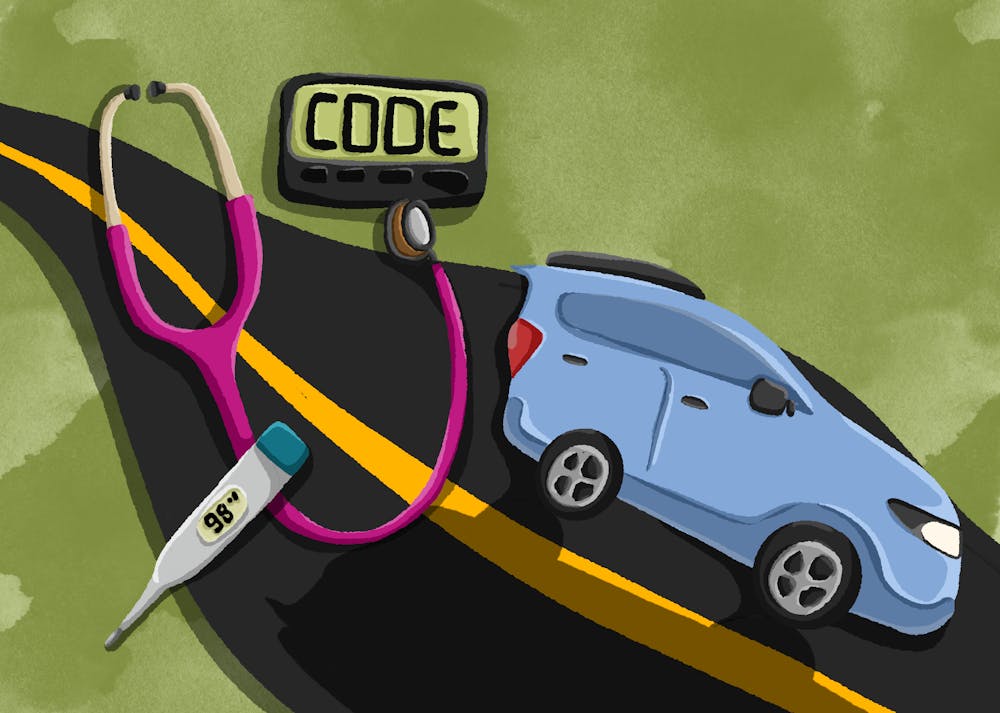Clinicals are a program for nursing students at ASU to shadow registered nurses in hospitals and various medical care facilities to gain real-world experiences. They are required for graduation, but transportation to the facilities can be a struggle in itself.
Finding a way to get to the clinicals about once a week is a point of anxiety, in an already demanding and stressful degree program, Destiny Laing, a senior studying nursing, said.
Surveys are released to all nursing students before they receive their clinical placements, but they do not guarantee any specific setting or location and can be anywhere in the greater metropolitan Phoenix area, said Nancy Kiernan, senior director of Academic Services in the Edson College of Nursing and Health Innovation, in an email.
"I did note to them (clinical coordinators) that I wanted a close hospital, because I didn't have transportation, and I honestly don't know if they looked at that," junior nursing major Leslye Corrales Garcia said.
Students can be assigned to a day or overnight clinical, varying from 5 to 12 days a semester and last approximately 13 hours, Kiernan said in the email.
“You can say you have a preference for a hospital, but if there isn’t a space (for you) they will just place you anywhere,” Laing said.
After Edson College sent out an email to upperclass nursing BSN students that their placement would be in either Phoenix or Paradise Valley, Laing immediately reached out to her coordinator to let her know she did not have reliable transportation.
A trip on public transportation, which is how Laing usually gets to class, from the Downtown Phoenix campus to Paradise Valley can take upwards of an hour without accounting for traffic.
"Transportation is very stressful when you don't have a car; you have to be creative," Laing said.
Although Laing's clinical coordinator was not able to help with anything transportation-wise, she was able to push for her to be placed at a closer location.
"While it is the student's responsibility to arrange for transportation to and from clinical sites, we encourage use of mass transit, ride-sharing and carpooling," Kiernan said in the email.
During Corrales Garcia's first three weeks at the Carl T. Hayden Veterans' Administration Medical Center, she carpooled with friends that also live at Fusion on First on the Downtown Phoenix campus.
Now, they are at the Southeast VA Clinic, which is about 30 to 40 minutes away from the Downtown Phoenix campus.
"If I didn't have people carpooling with me, it would be really tough for me," Corrales Garcia said. "I would have considered doing something else at this point because transportation is a really big part of the nursing program."
Some people have been driving really far distances, such as all the way from Peoria to The Southeast VA Clinic in Gilbert, about an hour and a half, said Charlene Tran, a junior studying nursing.
Edson encourages students to connect with their clinical team of eight students to discuss carpooling, Kiernan said in the email.
"I feel guilty for carpooling and for asking people to drive me places, so I just Uber instead of asking them every time, but it gets really expensive," Laing said.
Laing's first couple of days of clinicals cost about $30 for a one-way Uber, but costs usually hover around $20 on a good day.
"I was really scared, I didn't know what I was going to do because I didn't have a car, I was worried (about) where I was going to get placed and how far it was going to be because I knew it was going to be costly if I couldn’t find anyone around me to carpool," Corrales Garcia said.
Something like the intercampus shuttles would be really helpful for students who do not have transportation, as a lot of students are out of state or don’t have a driver’s license, according to Tran.
Making any kind of effort to accommodate students who carpooling is not an option for is needed, Laing said.
"I know they say it's our responsibility, but it does add up, and I'm not working right now because nursing, at least for me, is really stressful," said Corrales Garcia.
Especially for students that have clinicals further away, the University should offer them options that are closer to where they live or at least try to find any solution at all, Andrea Arana, a junior studying nursing said.
"At this time, Edson college does not have any plans to provide transportation to clinical placements other than to encourage students to utilize mass transit, ride sharing, and carpooling," Kiernan said in the email.
"I feel like they (instructors and clinical coordinators) all just assume that we all have our own cars and that we all drive, which is not true," Laing said.
Edited by Jasmine Kabiri, David Rodish and Grace Copperthite.
Reach the reporter at abickle@asu.edu and follow @AlyssaBickle1 on Twitter.
Like The State Press on Facebook and follow @statepress on Twitter.

Alyssa Bickle is a staff reporter, writing for the community and culture desk. She is a writing tutor for University Academic Success Programs, and a fellow in the Center for the Study of Religion and Conflict. She is pursuing bachelors degrees in journalism and political science.




